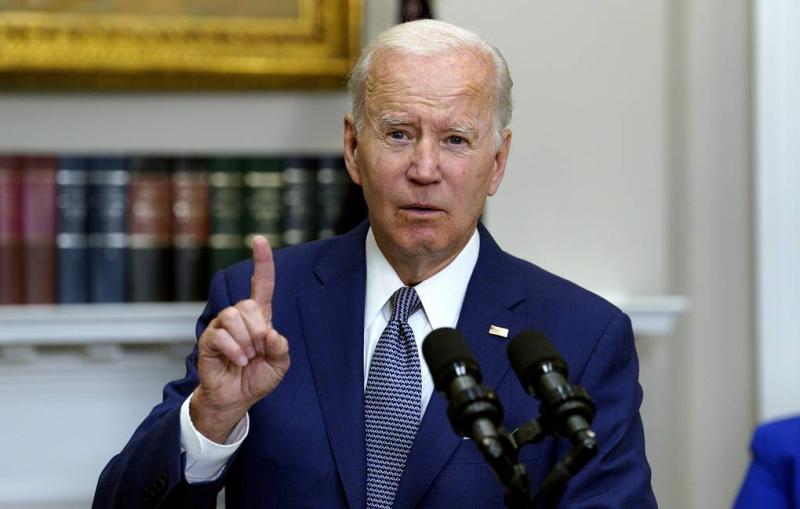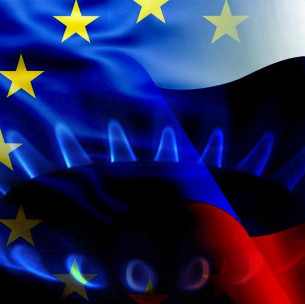
© EPA-EFE/Yuri Gripas/POOL/TASS
Top stories from the Russian press on Tuesday, July 12th, prepared by TASS
Izvestia: Biden seeks to create anti-Russian front in Middle East
US President Joe Biden will travel to the Middle East with the aim to create a front against Russia and China. Amid its standoff with Moscow, Washington has already tried to persuade Saudi Arabia to increase oil output but failed, Izvestia notes.
"Riyadh is the United States’ strategic partner in two fields, oil production and defense. They have maintained allied relations since Saudi Arabia declared independence in 1932. However, Washington’s attitude to Riyadh was that of a senior during the Cold War and it has been hegemonic since the 1990s," Research Fellow at the Department of Middle and Post-Soviet East of the Russian Academy of Sciences’ Institute of Scientific Information on Social Sciences Vasily Ostanin-Golovnya noted. "Russia has a certain advantage over the US. There was a very successful visit by Foreign Minister Sergey Lavrov, the parties reached some agreements and the kingdom is unlikely to breach them," the expert explained.
"Cracks between the US and Saudi Arabia appeared long before the Ukrainian crisis, which prompted the kingdom and the United Arab Emirates to show defiance and refuse to increase oil output following Washington’s embargo on Russian energy. There is also a personal aspect. The country’s actual leader Mohammed bin Salman has complicated relations with the United States’ Democratic establishment," the specialist pointed out.
"The Saudis have no reason to make agreements with the Democrats," orientalist scholar Andrey Ontikov emphasized. "The Saudis are well aware that if the Americans succeed in suppressing Russia one way or another or putting really strong pressure on Moscow, then Saudi Arabia may be the next in line to undergo ‘democratic changes,’ that is, the processes that took place during the Arab Spring. The Saudis don’t need any of that. They would like to have an alternative to the US. Russia can become such an alternative," the expert added.
Nezavisimaya Gazeta: Johnson at risk of becoming Conservative ‘scapegoat’
The struggle for the position of the Conservative Party’s leader and prime minister continues in the United Kingdom following Boris Johnson’s resignation. More politicians are announcing plans to throw their hat into the ring for the leadership race. Former Defense Secretary Penny Mordaunt and Foreign Secretary Elizabeth Truss have joined the race recently. Meanwhile, long-term issues have receded into the background, including the question of how London’s policies will change and will it be open to improving soured relations with a number of countries. However, Russia certainly won’t be one of those, Nezavisimaya Gazeta notes.
The Tories may unload difficult issues by shifting the blame for wrong decisions to Johnson. Since the party’s rating is more important, he may well be sacrificed. It will be particularly important if it eventually comes to an early parliamentary election.
Building ties with the European Union could be one of the options for improving the UK’s economic situation. Although the issue of Northern Ireland won’t become less sensitive, concessions by London may ease tensions and increase certainty in terms of economic prospects for cooperation with the EU. "Under these conditions, much will clearly depend on who becomes the next British prime minister. Anyway, the rhetoric is likely to be softened," Head of the Center for Political Integration Studies at the Russian Academy of Sciences’ Institute of Europe Lyudmila Babynina pointed out.
The expert believes that the Tories will hardly have mercy on Johnson in their efforts to restore their ratings. At the same time, Babynina notes that the prime minister has fallen victim to his own infantilism rather than a conspiracy by his subordinates. "He had been pressured to step down two days before the situation actually started to unfold. I think the problem is that Johnson used to get away with many things, which made him careless. In the end, it wasn’t a specific scandal that forced him to resign but an endless series of scandals," the analyst concluded.
Izvestia: UN hopeful to agree on humanitarian supplies to Syria
The UN Security Council failed to reach an agreement on a cross-border mechanism for humanitarian aid deliveries to Syria’s Idlib. The corridor was used for the delivery of goods to northwestern Syria directly from Turkey, without Damascus’ assistance. Ireland and Norway called for extending the mechanism for 12 months but Russia rejected the resolution and suggested a six-month extension, which was blocked by the US. However, Izvestia’s source in the UN specified that the matter was not closed yet and things could be sorted out later in the week.
Orientalist scholar and former diplomat Vyacheslav Matuzov believes that "the general standoff between Russia and the West" has been expanded to the UN Security Council. "Our resolution was blocked in the Security Council at the US behest. It is part of a global standoff with the West, part of the 11-year-long standoff between Russia and the US in Syria, where the Americans are illegally occupying one-third of territory in Syria’s northeast, that is, the country's oil-producing regions," the expert stressed.
According to him, the substance of Damascus’ grievances against the mechanism is that it allows terrorist groups in control of the situation in Idlib - Hay'at Tahrir al-Sham and the Islamic State (both outlawed in Russia) - to enrich themselves. They control the distribution of aid in Idlib so their influence in the region is in no way declining, Matuzov explained.
Political scientist Dmitry Bridzhe pointed out that as far as the cross-border mechanism was concerned, it was crucial to take Turkey’s position into account since Erdogan planned to launch a military operation into Syria’s northeast near Idlib in the near future. "Ankara does not want to lose Idlib, where it has certain support among the local population. Turkey views the region as a springboard for future operations, while local opposition forces, including the Free Syrian Army, are Turkey’s main allies in operations against the Kurds in the region," the analyst specified.
Nezavisimaya Gazeta: Europe reaches brink of protracted gas crisis
Europe’s gas prices retreated on Monday following reports of Canada’s plans to finally send Gazprom’s turbines back. However, analysts don’t think that the move will help restore gas flows through the Nord Stream pipeline, and expect a protracted gas crisis to hit the region, Nezavisimaya Gazeta writes.
The start of maintenance works on the pipeline is complicating the situation as gas transportation via both of the pipeline’s strings will remain suspended on July 11-21.
Experts believe that once maintenance works are over, gas supplies via Nord Stream will be restored but it will take them a long time to rebound to the previous levels. "The transportation of the gas turbine is expected to be completed in two weeks starting on July 14. Given the time needed for its installation, gas supplies may be increased by the end of July," TeleTrade Chief Analyst Mark Goikhman noted. However, he did not rule out that the process might be delayed for political and technical reasons. Besides, it’s unclear how things will turn out with another two turbines that also need maintenance. "Gazprom expects the Siemens company to carry out routine repair works before the end of the year," the expert said.
"Reckless commentators have the cause and effect backwards. First, the EU did everything to reduce Russian gas supplies and then it started wailing about declining gas flows. It was the German chancellor that banned Nord Stream 2, while EU politicians and officials delayed its launch procedures by a year and six months. Then, there was more. The EU slapped sanctions on Russia, ending the export of components for gas pipelines. Gas supplies were suspended because pipelines needed maintenance. And the EU is now complaining that Russia has reduced supplies," Departmental Executive Director at Iva Partners Artem Tuzov emphasized.
Kommersant: Shortages of goods alarm Russians more than threat of nukes
Price hikes and shortages of goods worry Russians more than any possible aggravation of the situation during the special military operation in Ukraine, Kommersant writes, citing the National Anxiety Index released by the CROS agency. Experts explain that people have grown used to living under the special operation climate and they are starting to worry more about things that affect them directly.
Users are keeping a close eye on the situation, expressing concerns about rising tensions, including the threat of the use of nuclear weapons. However, it’s not military activities that are the main cause of Russians’ phobias but a spike in prices and shortages of goods, as well as public reaction to the developments after February 24, including the departure of some celebrities and Western sanctions. The special operation itself comes third.
CROS Director of Analytics Andrey Lebedev points out that although people are getting used to the special operation, the level of anxiety remains high. "It is mostly triggered by changing consumption patterns, particularly, restrictions on the media and the Internet. Everyone is used to freely communicating on social media but there are fewer opportunities for that now. In addition, foreign brands are leaving and people are struggling to figure out who will replace them, while they are unwilling to change their tastes and habits," the analyst added.
Political Analysis Director at the Institute of Social Marketing (INSOMAR) Viktor Poturemsky notes that "people are primarily concerned about what’s happening with them, particularly, their personal economic situation." With that in mind, Poturemsky points out that some of the anxieties are potential. "People often worry about things that may not happen at all," the expert stressed.









